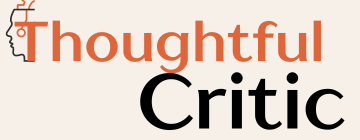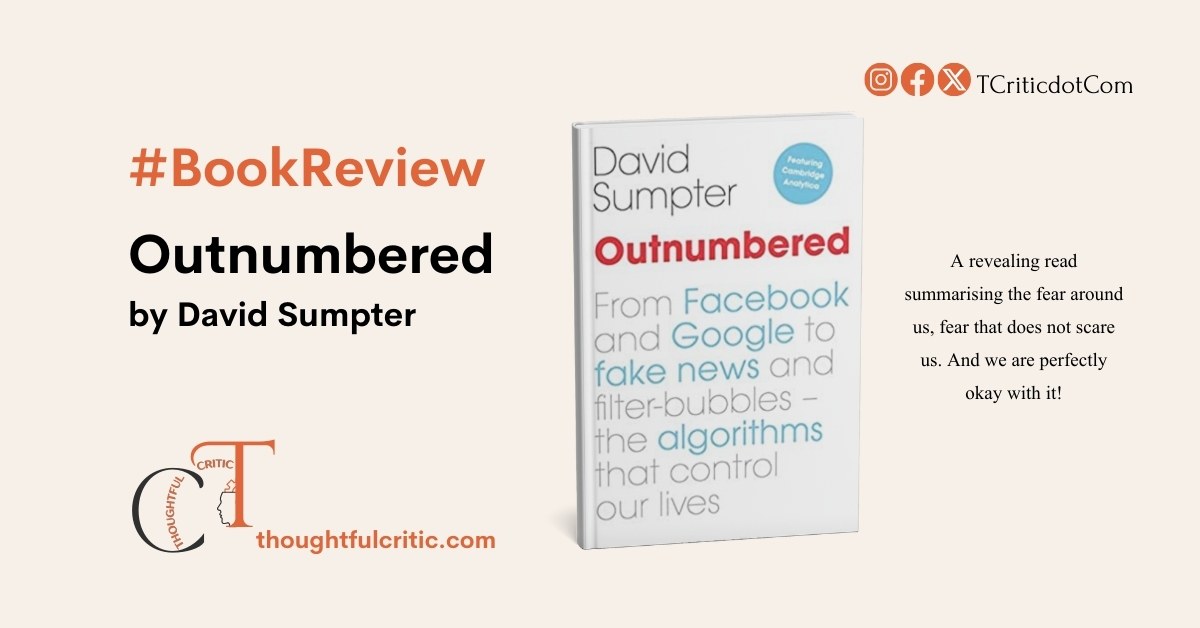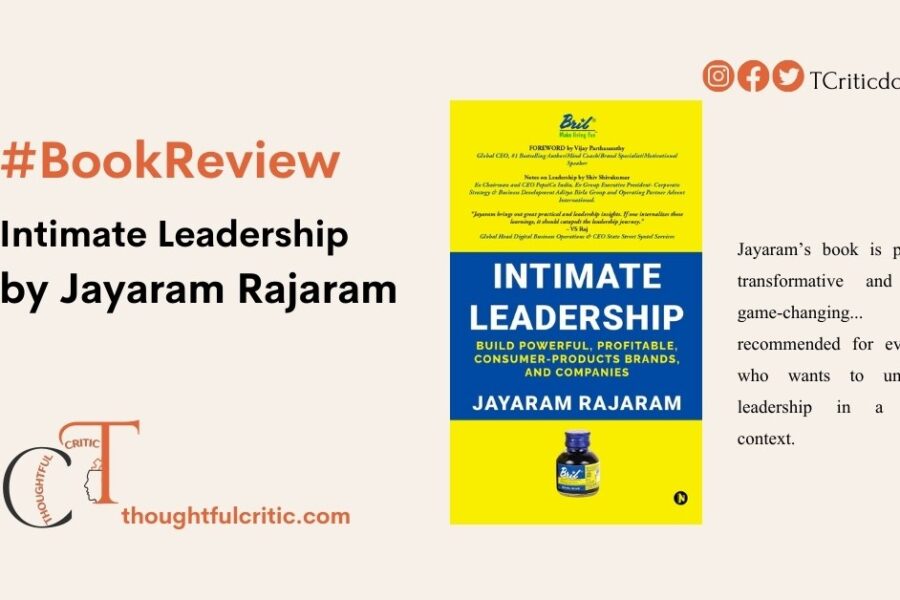It’s a familiar moment in the digital age: you’re scrolling through your phone when an ad suddenly appears, offering exactly the product you casually mentioned in conversation a week ago. At first, it feels uncanny, almost magical—how did they know? But beneath this seemingly innocuous event lies a complex web of algorithms silently tracking, analysing, and predicting your behaviour. David Sumpter’s Outnumbered: From Facebook and Google to Fake News and Filter-bubbles – The Algorithms That Control Our Lives unravels this very phenomenon, shedding light on the invisible forces shaping our daily experiences. By exploring how algorithms influence everything from the ads we see to the news we read, Sumpter’s book offers a crucial lens for understanding technology’s pervasive, often unsettling role in modern life. Want to know more? Read this review first, and then read the book.
David Sumpter’s Outnumbered: From Facebook and Google to Fake News and Filter-bubbles – The Algorithms That Control Our Lives is a timely and thought-provoking exploration of the pervasive influence of algorithms on modern society. In this book, Sumpter, a mathematician and professor of applied mathematics, delves into the intricate algorithms underpinning the digital platforms we interact with daily. He examines how these algorithms shape our online experiences, influence our decisions, and, ultimately, control aspects of our lives in ways that are often invisible to us. The book is both an accessible introduction to the technical underpinnings of algorithms and a critical examination of their societal implications. Sumpter’s work is particularly relevant in an era where digital platforms dominate communication, commerce, and even politics, making it essential for anyone seeking to understand the forces shaping our contemporary lifestyle.
One of the book’s greatest strengths is its ability to demystify complex mathematical concepts for a general audience. Sumpter avoids overwhelming the reader with jargon or overly technical explanations, instead using relatable examples and analogies to explain how algorithms function. For instance, he breaks down the mechanics of Facebook’s news feed algorithm, Google’s search engine rankings, and Netflix’s recommendation system, showing how these systems are designed to capture and retain user attention. By doing so, he reveals the underlying logic of these algorithms, which often prioritise engagement over accuracy or quality. Sumpter argues that this focus on user engagement has profound consequences for the information we consume, the opinions we form, and the communities we engage with online. His analysis is particularly compelling when he discusses the role of algorithms in creating filter bubbles—echo chambers where users are exposed primarily to information that reinforces their existing beliefs. This phenomenon, he suggests, contributes to the polarisation of public discourse and the spread of misinformation, issues that have become increasingly salient in recent years.
Sumpter’s critique of algorithms is not limited to their role in shaping information ecosystems; he also examines their impact on individual behaviour and decision-making. He discusses how algorithms are used in areas such as online advertising, financial trading, and even dating apps, highlighting their ability to predict and influence human behaviour with remarkable accuracy. For example, he explains how platforms like Facebook and Google use vast amounts of data to target users with personalised ads, creating a feedback loop that reinforces certain behaviours and preferences. While this can lead to more efficient and convenient services, Sumpter warns that it also raises ethical concerns about privacy, autonomy, and manipulation. He questions whether individuals are truly making free choices in a world where algorithms are constantly nudging them in specific directions, a concern that resonates deeply in an age of increasing surveillance and data collection.
The book also addresses the broader societal implications of algorithmic control, particularly in democracy and governance. Sumpter explores how algorithms have been used to manipulate public opinion, citing examples such as the Cambridge Analytica scandal and the spread of fake news during the 2016 U.S. presidential election. He argues that the opacity of these algorithms, combined with their ability to amplify particular messages while suppressing others, poses a significant threat to democratic processes. By allowing a handful of tech companies to control the flow of information, society risks ceding too much power to unelected entities whose primary goal is profit rather than the public good. This critique is particularly relevant in light of ongoing debates about the regulation of tech giants and the need for greater transparency in algorithmic decision-making.
Despite his critical stance, Sumpter does not dismiss algorithms outright. He acknowledges their potential to solve complex problems and improve efficiency in various domains, from healthcare to transportation. However, he emphasises the importance of designing algorithms with ethical considerations rather than treating them as neutral tools. He calls for greater accountability and oversight in developing and deploying algorithms, suggesting that policymakers, researchers, and the public must work together to ensure these technologies serve the common good. This balanced perspective is one of the book’s most valuable contributions, as it avoids the pitfalls of techno-utopianism and techno-pessimism, offering a nuanced view of the challenges and opportunities algorithms pose.
In evaluating Sumpter’s arguments in light of contemporary lifestyle, it becomes clear that his concerns are valid and increasingly urgent. The COVID-19 pandemic, for instance, has accelerated the shift toward digital platforms for work, education, and social interaction, making algorithms even more central to our daily lives. At the same time, the pandemic has highlighted the dangers of misinformation and the role of algorithms in amplifying it, as seen in the proliferation of conspiracy theories and anti-vaccine content online. Sumpter’s warnings about the societal impact of algorithms feel prescient in this context, underscoring the need for a more critical and informed approach to their use.
Moreover, the book’s exploration of filter bubbles and polarisation is particularly relevant in an era of heightened political and social divisions. The rise of populism, the spread of extremist ideologies, and the erosion of trust in institutions can all be linked, at least in part, to how algorithms shape our online experiences. Sumpter’s analysis provides a valuable framework for understanding these phenomena, offering insights into how algorithms contribute to the fragmentation of public discourse and the challenges of building consensus in a digitally mediated world.
That said, the book is not without its limitations. While Sumpter’s explanations of algorithms are generally clear and accessible, some readers may find his discussions of mathematical concepts overly simplistic or lacking in depth. Additionally, while justified, his focus on the negative aspects of algorithms occasionally overshadows their potential benefits. A more balanced exploration of how algorithms can be harnessed for positive social change would have strengthened his argument and provided a more comprehensive view.
In conclusion, Outnumbered is a compelling and insightful examination of the algorithms that shape our lives. David Sumpter succeeds in making complex topics accessible to a broad audience while raising essential questions about algorithmic control’s ethical and societal implications. His timely and relevant critique offers valuable insights into the challenges digital platforms pose in an increasingly interconnected world. While the book could benefit from a more balanced discussion of algorithms’ potential benefits, it remains essential for anyone seeking to understand the forces influencing our contemporary lifestyle. As algorithms play an ever-greater role in our lives, Sumpter’s call for greater accountability and ethical consideration is a message that cannot be ignored.
Get a copy of this book from Amazon India – click here.
Review by Gunjan for Thoughtful Critic
Outnumbered: From Facebook and Google to Fake News and Filter-bubbles – The Algorithms That Control Our Lives by David Sumpter: Book Review
-
Thoughtful Rating
Summary
The book will intrigue you, excite you, make you admire the wonders surrounding us, and then make you sad – we are in a trap we cannot defeat!




